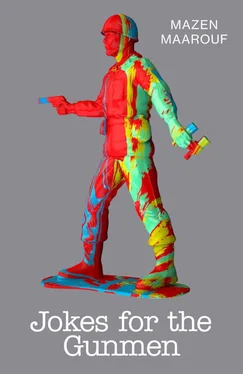The next day, the Saturday, as part of the funeral procession from the mortuary to the cemetery, some of the slaughtermen wanted to take his body into the courtyard of the slaughterhouse, where he had performed his exploits and built his reputation. Mother agreed, on the condition that we call in at the house so that she could dress him up in the matador suit.
I thought this was silly, because the suit was too baggy for him and people would make fun of his appearance. I said this to Mother, but she whispered, ‘I’ll deal with that. Anyway, no one looks too closely at the size of the clothes dead people wear in their coffins.’
Mother asked me to help dress my uncle in the matador suit, to preserve his dignity. It was very hard to do, because his body was heavy and the sitting room was hot without the air conditioning. We put him in a sitting position, completely naked. I was about to lift his arm when he started to come round. ‘What are you doing, you monkey?’ he said. His repeated deaths had made him bad-tempered. Grouchy. When he realized that Mother was dressing him in the matador suit and planned to lower him into his grave, he was angry. He insulted her and pushed her away, and she fell over. I didn’t like seeing my mother being mistreated, because she had good intentions. But I was worried he might lay into me, so I kept silent. ‘Do you want the matador guys in heaven to make fun of me?’ he said.
We told the people waiting outside that my uncle had come back to life, and they dispersed. Some of them were annoyed and asked us not to tell them next time my uncle died, because they thought they had done their duty by taking part in the funeral procession already.
My uncle stayed with us from the Friday to the Sunday and died in the slaughterhouse at dawn on the Monday morning. He had lost hope of gaining enough weight to fit in the suit. The story of the baggy suit had leaked out – I don’t know how. Probably it was Mother. Mother always had good intentions. She had spoken to a seamstress, who was her friend, asking if there was any way the suit could be taken in. The seamstress said, ‘No,’ and let out the secret. The whole slaughterhouse found out. They made fun of my uncle. He went to the slaughterhouse wearing the baggy suit. He went into the courtyard and they let out the biggest cow. My uncle couldn’t control it because he was tripping up on the suit, and the cow trampled him and he died. We buried him, crushed and bloodied, on Tuesday morning, a week after his first death. Only a few people attended the burial.
Mother washed the matador suit and asked me to dispose of it. We needed the money, so I sold it at the Sunday market for second-hand clothes. I laid out some plastic sheeting that Mother had lent me and arranged the suit on top in three pieces – the trousers, the shirt and the jacket. My uncle had never owned matador shoes or underwear. I had no other items for sale and I had to sell the suit at any price. But I was lucky, as people soon started gathering.
In the end a foreign man came up and started examining it. Then he asked me in broken Arabic, ‘Where you get this suit?’ I was worried. He added, ‘This is Dominguín’s suit, the famous matador’s.’ He gave me a large sum for it and with the money I was able to buy an air-conditioning unit and boxing gloves as well. I gave the rest of the money to Mother. My cotton pyjamas were waiting for me to wear them again, and I said to Mother, ‘If I die, dress me in my pyjamas, and don’t forget to put my boxing gloves on.’
ABU ELIA’S BAR WAS THE CHEAPEST IN BEIRUT during the siege. It was one level below ground. Long and narrow, it was shaped rather like a rectangular biscuit. But it was safe, or at least it was rumoured to be safe. Its walls were said to be made of reinforced concrete, not that anyone ever tried to check. Abu Elia had set up a stand with postcards in the bar and sometimes, during the evening or at the height of the shelling, some of his foreign customers would take a postcard and start writing on it blithely, as if they were at a picnic. Abu Elia would make sure it was sent to the post office the next day.
My father was the gramophone operator in the bar. That was his job. He spent hours and hours standing behind the bar, turning the handle of a Berliner gramophone from 1900 – there was no electricity and the bar was usually lit by candles. Sometimes he turned the handle slowly, because he was tired, and if a shell landed nearby, he might lose concentration and turn it faster, which would distort the music. But none of the customers paid any attention, because the sound from the gramophone was so faint it could hardly be heard anyway. What interested them was not so much the music it played but its age and the fact that it was manual. If you wanted to listen to a song you had to go up to the bar. The gramophone was my father’s; he had inherited it from my grandfather, and had played it when he was young. He had been friends with Abu Elia since their school days and had suggested putting it in Abu Elia’s bar. My father was like a DJ. He came home at dawn and, if I was awake, he would ask me to massage his arms. I liked that. He always fell fast asleep while I was massaging his strong arms.
Abu Elia’s bar was only hit once, by a vacuum bomb that struck the whole building. The shell cut through three floors before exploding and crushing the building like an overripe pear. My father was one of the victims of course. Where he was, behind the gramophone player at the end of the bar, it would have been impossible to escape. The bomb sucked out all the air when it exploded but my father went on turning the handle of the gramophone for a moment, puzzled that the sound had completely disappeared. He was totally confused. He wasn’t even sure that his arm was really moving. For a moment he thought I hadn’t massaged his arm properly at dawn the day before and he cursed me. Then he started to suffocate and the walls and ceiling folded in on top of him.
But my father didn’t die. He came out of the bombing alive. No one had expected him or any of the people who lived in the building or who happened to be in the bar at the time to survive. He was the only one, saved by the gramophone, which was crushed of course. He told me later that just before the building collapsed some of the customers were gathered around him, examining the gramophone and listening to the faint sound it made. Before they met their doom, they were drinking beer and making jokes about my father and his gramophone.
The people in the bar died faster than they might have done, because there were no chairs in the place. Another unusual feature of Abu Elia’s bar was that five of the eight brands of beer it served were sometimes of dubious authenticity. When I reached the building, I didn’t know my father was still alive. There were four or five ambulance men there. They were volunteers. One of them asked me, ‘Can you identify your father’s body?’ ‘Definitely,’ I replied, without thinking. ‘Then make your way through the rubble and when you find it, point it out to me,’ he said. I walked in. There was a smell of dead people mixed with beer, and the bodies were soaked. Even the rats hadn’t survived. They had suffocated too and their eyes were bloodshot. The beer froth was still fresh and was seeping between the blocks of stone. These were not the best kind of dead people as far as those ambulance men were concerned. They were people who had died while drinking alcohol and it was not going to be fun digging them out.
I recognized my father’s body from the arm I used to massage. The fingers were still clenched around the small handle of the gramophone. That made me smile. My father was as obstinate as a mule, although he was usually good-natured. I pointed out my father to the ambulance man and we pulled his body out together. It was easy to free it, despite the massive amount of rubble. The ambulance man, who was wearing a white mask, said, ‘Boy, you’re lucky. We won’t be able to recover some of the bodies until the bulldozers arrive this evening.’ I left my father’s body in the ambulance. The ambulance man refused to let me take the gramophone handle. My father’s arms were completely caked in blood and were like punctured tubes. I went to tell my mother. I was sixteen years old.
Читать дальше












